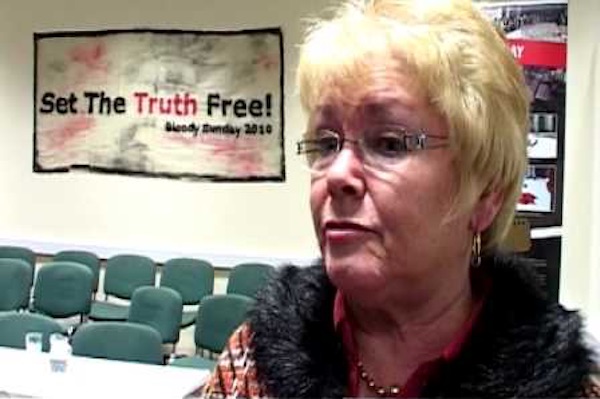
By Eamonn McCann (for the Belfast Telegraph)
Many people outside Derry say - and others may frequently feel like saying - that the city does go on a bit about its grievances. This week is no exception, with another eruption of rage over Bloody Sunday.
This time, the proximate cause was the announcement on Tuesday by Marianne O’Kane of the PPS that the decision last March to charge a single soldier with the 1972 killings would stand.
None of the 15 other paratroopers present in the Bogside over the minutes of the massacre would face legal proceedings.
‘Soldier F’ alone, charged with the murder of James Wray and William McKinney and the attempted murder of five others, is to stand trial.
The prospect is of one rank-and-file soldier taking the rap for the shooting spree that left Rossville Street littered with bodies.
Family members and other campaigners gathered at the Bloody Sunday monument on that street on Tuesday after word of the latest foretold development came through.
“How can they think that that will do us?” asked Kate Nash, whose 19-year-old brother, William, was killed and her father, Paddy, wounded when he went out onto the street to comfort his dying son.
“They are still asking us to call it quits,” she said. “That’s not going to happen. They have a nerve.”
Appeals to “move on” in the interest of reconciliation cut no ice with Ms Nash: “Who do they want me to reconcile with?”
Bloody Sunday was different.
Not in the scale of the killing - greater numbers died in other Troubles crimes - but in the circumstances of the deaths and the political ramifications.
Almost all of the atrocities that mark out the via dolorosa of the North’s last half-century can be ascribed to groups purporting to represent one community visiting death on the other community.
But not Bloody Sunday.
Nor were the Bloody Sunday deaths perpetrated by ambush in the dead of night, or furtive bomb affixed to a van, or acrid eruption into a late-night pub or a bookies’.
The murders were done in broad daylight, on a crisp winter’s afternoon, in a crowded area where thousands had gathered after a civil rights march.
Each killing was witnessed at close quarters by scores of local people scurrying for safety.
All of the victims, with one exception, came from the Bogside/Creggan/Brandywell area.
From the evening of that day until now, Bloody Sunday has been experienced not as a series of killings leaving broken families to be comforted, but as a pitiless onslaught against the entire community.
It has left the communal wound that was on display on Tuesday, as on every day for decades when a new possibly decisive development was believed to be imminent.
It will go on.
Tuesday’s developments arose only because lawyers for the families had secured a judicial review asking for the decision to charge only one soldier to be set aside.
The families’ lawyers are now on their way back to court to ask for the latest decision, too, to be overruled.
“I know that today’s outcome will cause further upset to those who have pursued a long and determined journey for justice over almost five decades,” Ms O’Kane said.
“I can only offer reassurance to all of the families and victims of Bloody Sunday, and the wider community, that my decisions were conducted wholly independently and impartially, and in accordance with the code for prosecutors.”
But Kate Nash said the whole establishment “wants us to shush”.
“They say Catholics and Protestants should come together to make a united community,” she said.
“I have no problem whatsoever with that, but it’s got nothing to do with Bloody Sunday.
“Protestant people weren’t involved in shooting my brother and my father.
“It was the Paras and the people who sent them. I don’t believe they give two hoots about any community here.”
![[Irish Republican News]](https://republican-news.org/graphics/title_gifs/rn.gif)
![[Irish Republican News]](https://republican-news.org/graphics/title_gifs/harp.gif)

